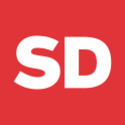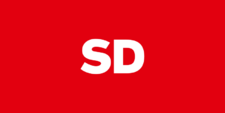Social Democrats (Slovenia) facts for kids
Quick facts for kids <div style="padding-top:0.3em; padding-bottom:0.3em; border-top:2px solid Lua error in Module:European_and_national_party_data/config at line 227: attempt to index field 'data' (a nil value).; border-bottom:2px solid Lua error in Module:European_and_national_party_data/config at line 227: attempt to index field 'data' (a nil value).; line-height: 1;">
Social Democrats
Socialni demokrati
|
|
|---|---|
 |
|
| Abbreviation | SD |
| Leader | Matjaž Han |
| Founder | Ciril Ribičič |
| Founded | 29 May 1993 |
| Preceded by | ZKS |
| Headquarters | Ljubljana |
| Youth wing | Youth Forum of Social Democrats |
| Membership (2013) | 12,109 |
| Ideology | Social democracy |
| Political position | Centre-left |
| European affiliation | Party of European Socialists |
| International affiliation | Progressive Alliance |
| European Parliament group | Progressive Alliance of Socialists and Democrats |
| Colors | Red |
| National Assembly | Lua error in Module:European_and_national_party_data/config at line 227: attempt to index field 'data' (a nil value). |
| European Parliament | Lua error in Module:European_and_national_party_data/config at line 227: attempt to index field 'data' (a nil value). |
| Mayors |
14 / 212
|
| Municipal council |
302 / 2,750
|
| Party flag | |
 |
|
| Website | |
| Lua error in Module:European_and_national_party_data/config at line 227: attempt to index field 'data' (a nil value). | |
The Social Democrats (SD) is a political party in Slovenia. It is known for its centre-left ideas, which means it supports social fairness and helping everyone in society. The party is currently led by Matjaž Han.
From 1993 to 2005, the party was called the United List of Social Democrats. It is also seen as a continuation of the League of Communists of Slovenia. As of 2022, the Social Democrats are part of Slovenia's government. They work with the Freedom Movement and The Left. The party is also a member of larger European political groups, like the Party of European Socialists and Progressive Alliance.
History
How the Party Started (1989–1992)
The Social Democrats party began in 1989. At that time, the League of Communists of Slovenia decided to allow more than one political party. This was a big change for Slovenia.
On January 23, 1990, the Slovenian Communists left the larger League of Communists of Yugoslavia. Soon after, on February 4, 1990, they changed their name. They became the League of Communists of Slovenia-Party of Democratic Renewal. Ciril Ribičič, a well-known politician, became the new leader.
In April 1990, Slovenia held its first democratic elections. The party did not win against the centre-right group called DEMOS. However, they still became the biggest single party in Slovenia.
From 1990 to 1992, the party was in the opposition. This means they were not part of the government. After the government changed in 1992, the party joined a new government. This government was led by Janez Drnovšek. The same year, the party changed its name again to Social Democratic Renewal.
Forming the United List (1992–1996)
Before the 1992 elections, several left-leaning parties decided to work together. They formed a group called the United List. This group included the Social Democratic Renewal and three smaller parties.
In the 1992 election, the United List became the third-largest political group. They then joined a "grand coalition" government. This government was led by Prime Minister Janez Drnovšek.
On May 29, 1993, the parties in the United List officially joined together. They formed one party called the United List of Social Democrats. Janez Kocijančič was chosen as its first president.
The party stayed in government until January 1996. They left because they disagreed about how much money the government should spend on social programs. After this, some members left and started a different party. In the 1996 elections, the United List of Social Democrats lost a lot of support.
The Borut Pahor Years (1996–2012)
From 1996 to 2000, the party was in the opposition again. In 1997, Borut Pahor became the new party president. Under his leadership, the party started to become more moderate.
In the 2000 election, the party gained more votes. They joined a centre-left government led by Janez Drnovšek. Borut Pahor became the chairman of the Slovenian National Assembly. In the 2004 elections, the party went back into opposition.
In 2005, the party decided to shorten its name to just Social Democrats. Borut Pahor continued as president. In 2006, the party clearly moved away from its past communist connections. Its president spoke out against the socialist government that existed after World War II.
After 2004, the Social Democrats became the main centre-left opposition party. In 2007, some important members from another party joined the Social Democrats. This made the Social Democrats the second-largest party in Slovenia's parliament.
In 2008, the Social Democrats won the parliamentary election with 30.45% of the votes. They formed a new government with other parties. They won 29 seats in the 90-member National Assembly.
In the 2011 elections, the Social Democrats received 10.5% of the votes. They won 10 seats in the National Assembly. They were the third-largest party. After this election, they were in opposition for a short time.
New Leaders (2012–Present)
In June 2012, Borut Pahor did not win re-election as party president. Igor Lukšič became the new leader.
In March 2013, the Social Democrats joined a new government. This government was led by Alenka Bratušek. However, Bratušek resigned in May 2014, leading to new elections.
After the 2014 European Parliament election, where the party won only one seat, Igor Lukšič resigned. Dejan Židan was then elected as the new leader.
In the 2014 Slovenian parliamentary election, the party won 6 seats. In September 2014, the Social Democrats joined a new government.
The party improved its results in the 2018 parliamentary election. They won ten seats in the National Assembly. The Social Democrats then joined Marjan Šarec's government. They held important roles like Minister of Justice and Minister of Culture. This government ended in January 2020.
Tanja Fajon became the party leader in 2020. In the 2022 Slovenian parliamentary election, the party won 7 seats. They joined the current government coalition. Matjaž Han became the party leader in 2024.
International Connections
The United List of Social Democrats became a full member of the Socialist International in 1996. Since May 16, 2003, the Social Democrats have been a full member of the Party of European Socialists (PES). They also helped start the Progressive Alliance in 2013. The party was removed from the Socialist International in 2014 because of unpaid fees.
Election Results
These tables show how the Social Democrats have done in different elections.
National Assembly Elections
| Election | Leader | Votes | % | Seats | +/– | Government |
|---|---|---|---|---|---|---|
| 1990 | Ciril Ribičič | 186,928 | 17.28 (#1) |
14 / 80
|
Opposition | |
| 1992 | 161,349 | 13.58 (#3) |
14 / 90
|
Coalition | ||
| 1996 | Janez Kocijančič | 96,597 | 9.03 (#5) |
9 / 90
|
Opposition | |
| 2000 | Borut Pahor | 130,079 | 12.08 (#3) |
11 / 90
|
Coalition | |
| 2004 | 98,527 | 10.17 (#3) |
10 / 90
|
Opposition | ||
| 2008 | 320,248 | 30.45 (#1) |
29 / 90
|
Coalition | ||
| 2011 | 115,952 | 10.52 (#3) |
10 / 90
|
Opposition, 2012–13 | ||
| Coalition, 2013–14 | ||||||
| 2014 | Dejan Židan | 52,249 | 5.98 (#4) |
6 / 90
|
Coalition | |
| 2018 | 88,524 | 9.93 (#3) |
10 / 90
|
Coalition, 2018–20 | ||
| Opposition, 2020–22 | ||||||
| 2022 | Tanja Fajon | 79.709 | 6.69 (#4) |
7 / 90
|
Coalition |
European Parliament Elections
| Election | List leader | Votes | % | Seats | +/– | EP Group |
|---|---|---|---|---|---|---|
| 2004 | Borut Pahor | 61,672 | 14.15 (#4) |
1 / 7
|
New | PES |
| 2009 | Zoran Thaler | 85,407 | 18.43 (#2) |
2 / 8
|
S&D | |
| 2014 | Igor Lukšič | 32,484 | 8.08 (#5) |
1 / 8
|
||
| 2019 | Tanja Fajon | 89,936 | 18.66 (#2) |
2 / 8
|
||
| 2024 | Matjaž Nemec | 51,783 | 7.77 (#4) |
1 / 9
|
Presidential Elections
| Election | Candidate | 1st round | 2nd round | Result | ||
|---|---|---|---|---|---|---|
| Votes | % | Votes | % | |||
| 1990 | Milan Kučan | 538,278 | 44.43 | 657,196 | 58.59 | Won |
| 1992 | Milan Kučan | 795,012 | 63.93 | Won | ||
| 1997 | Milan Kučan | 578,925 | 55.54 | Won | ||
| 2002 | Lev Kreft | 25,715 | 2.25 | Lost | ||
| 2007 | Danilo Türk | 241,349 | 24.47 | 677,333 | 68.03 | Won |
| 2012 | Borut Pahor | 325,406 | 39.93 | 474,309 | 67.44 | Won |
| 2017 | Borut Pahor | 355,117 | 47.21 | 375,106 | 52.98 | Won |
| 2022 | Milan Brglez | 134,726 | 15.45 | Lost | ||
Independent candidate, support
Party Leaders
- Ciril Ribičič, 1990–1993
- Peter Bekeš, 1993
- Janez Kocijančič, 1993–1997
- Borut Pahor, 1997–2012
- Igor Lukšič, 2012–2014
- Dejan Židan, 2014–2020
- Tanja Fajon, 2020–2024
- Matjaž Han, 2024–
Images for kids
-
Borut Pahor, who led the party from 1997 to 2012. He was also Prime Minister and President of Slovenia.
See also
 In Spanish: Socialdemócratas (Eslovenia) para niños
In Spanish: Socialdemócratas (Eslovenia) para niños
 | Lonnie Johnson |
 | Granville Woods |
 | Lewis Howard Latimer |
 | James West |


